Related Research Articles

Illuminati: New World Order (INWO) is an out-of-print collectible card game (CCG) that was released in 1994 by Steve Jackson Games, based on their original boxed game Illuminati, which in turn was inspired by the 1975 book The Illuminatus! Trilogy by Robert Anton Wilson and Robert Shea. An OMNI sealed-deck league patterned after the Atlas Games model was also developed.
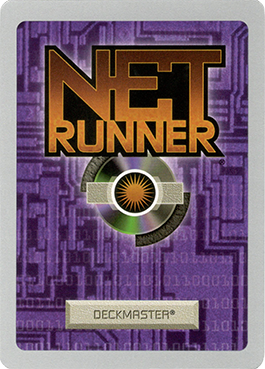
Netrunner is an out-of-print collectible card game (CCG) designed by Richard Garfield, the creator of Magic: The Gathering. It was published by Wizards of the Coast and introduced in April 1996. It was produced until 1999. The game took place in the setting for the Cyberpunk 2020 role-playing game (RPG), but it also drew from the broader cyberpunk genre.
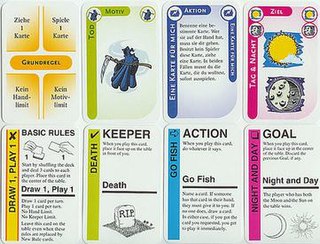
Fluxx is a card game, played with a specially designed deck published by Looney Labs. It is different from most other card games, in that the rules and the conditions for winning are altered throughout the game, via cards played by the players.
Chrononauts is a family of card games that simulates popular fictional ideas about how time travellers might alter history, drawing on sources like Back to the Future and the short stories collection Travels Through Time. The game was designed by Andrew Looney and is published by Looney Labs. The original game and a variant each won the Origins Award for Best Traditional Card Game.
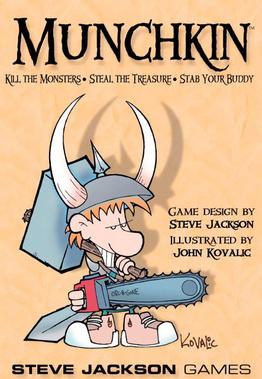
Munchkin is a dedicated deck card game by Steve Jackson Games, written by Steve Jackson and illustrated by John Kovalic. It is a humorous take on role-playing games, based on the concept of munchkins.
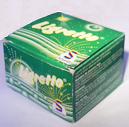
Ligretto is a card game for two to twelve players. The game in its current form was designed by Michael Michaels and published in 1988 by the German company Rosengarten Spiele. Since 2000 the game has been published by Schmidt-Spiele of Berlin, Germany. A blue version of the game has been published by Playroom Entertainment in North America and other English-speaking countries since 2009.

Bang! is a Spaghetti Western-themed social deduction card game designed by Emiliano Sciarra and released by Italian publisher DV Giochi in 2002. In 2004, Bang! won the Origins Award for Best Traditional Card Game of 2003 and Best Graphic Design of a Card Game or Expansion.

Pandemic is a cooperative board game designed by Matt Leacock and first published by Z-Man Games in the United States in 2008. Pandemic is based on the premise that four diseases have broken out in the world, each threatening to wipe out a region. The game accommodates two to four players, each playing one of seven possible roles: dispatcher, medic, scientist, researcher, operations expert, contingency planner, or quarantine specialist. Through the combined effort of all the players, the goal is to discover all four cures before any of several game-losing conditions are reached.

Qwirkle is a tile-based game for two to four players, designed by Susan McKinley Ross and published by MindWare in 2006. Qwirkle shares some characteristics with the games Rummikub and Scrabble. It is distributed in Canada by game and puzzle company Outset Media. Qwirkle is considered by MindWare to be its most awarded game of all time. In 2011, Qwirkle won the Spiel des Jahres. A sequel, Qwirkle Cubes, was released by Mindware in 2009.
Glenn Drover's Empires: The Age of Discovery is the first of the Glenn Drover's Empires board games, created by Glenn Drover.
The rules of Magic: The Gathering were originally developed by the game's creator, Richard Garfield, and accompanied the first version of the game in 1993. The rules of Magic have been changed frequently over the years by the manufacturer, Wizards of the Coast, mostly in minor ways. However, major rules overhauls have also been done a few times.

7 Wonders is a board game created by Antoine Bauza in 2010 and originally published by Repos Production. Three decks of cards featuring images of historical civilizations, armed conflicts, and commercial activity are used in the card drafting game 7 Wonders. The game received critical success upon its release, and won numerous awards, including the inaugural Kennerspiel des Jahres connoisseurs' award in 2011.
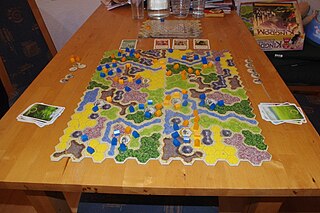
Kingdom Builder is a strategy board game designed by Donald X. Vaccarino, published in 2011 by Queen Games with illustrations by Oliver Schlemmer in German, British and international versions.

Village is a historical-themed euro-style board game with a focus on resource management for 2-4 players, released in 2011. It is designed by Inka Brand and Markus Brand.

Splendor is a multiplayer card-based board game, designed by Marc André and illustrated by Pascal Quidault. It was published in 2014 by Space Cowboys (Asmodee). Players are gem merchants of the Renaissance, developing gem mines, transportation, and shops to accumulate prestige points. Splendor received positive reviews and received numerous awards, including winner of Golden Geek Best Family Board Game. It was nominated for the Spiel des Jahres Game of the Year in 2014. The game also received a mobile application and an expansion released in 2017.
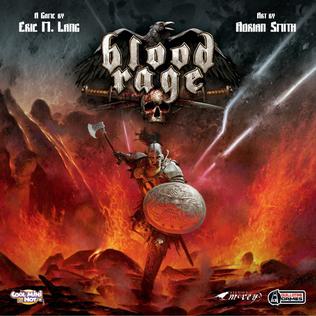
Blood Rage is a Viking themed board game designed by Eric Lang and published by CMON Limited in 2015. Each player controls a clan of mythological Vikings seeking glory as Ragnarok approaches. Played in three ages or rounds, Blood Rage features card drafting, battles and territory control via forces represented by sculpted plastic miniatures. All conflicts are resolved through playing cards, and cards are also used to improve and differentiate the different clans and the leaders, warriors, ships and monsters at their command.
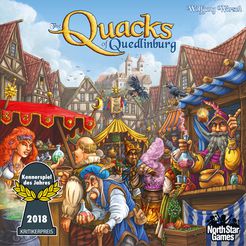
The Quacks of Quedlinburg, also known as Quacksalber, is a board game designed by Wolfgang Warsch and first published by Schmidt Spiele in 2018. After winning the Kennerspiel des Jahres in 2018, an English version of the game was released by North Star Games.

Evolution is a 2014 board game where 2-6 players build a highly competitive ecosystem of omnivores, carnivores and scavengers. Players adapt their existing species and evolve new ones in response both to the abundance or scarcity of food, but also the behaviour of other species in the ecosystem. The scoring system rewards players whose species have high populations, consume the most food and are the most diverse. It was designed by Dominic Crapuchettes of North Star Games, working with Dmitry Knorre and Sergei Machin, who had previously released a similar game in Russia.

Flesh and Blood is a trading card game published by Legend Story Studios (LSS), an independent design studio based in Auckland, New Zealand. It was designed by James White, who had previously played Magic: The Gathering professionally. The game is based on elements of fantasy and, to some extent, science fiction. The name of the game is derived from the phrase "flesh and blood", meaning that the game was designed to be played in person instead of as an online game.

Sagrada is a dice-drafting board game designed by Adrian Adamescu and Daryl Andrews and published in 2017 by Floodgate Games. Each player constructs a stained-glass window using dice on a personal 4×5 game board board with restrictions on the types of dice that can be played on each space. Players gain points by completing public and secret objectives for dice placements, and the one with the most after ten rounds is the winner.
References
- ↑ Liu, Jonathan H. (2014-12-10). "Bluff or Bribe Your Way Past the Sheriff of Nottingham". GeekDad. Retrieved 2020-09-16.
- ↑ "'Sheriff of Nottingham' Game". icv2.com. Retrieved 2020-09-16.
- ↑ Mortensen, Eric (2018-07-02). "Sheriff of Nottingham Board Game Review and Rules". Geeky Hobbies. Retrieved 2020-09-16.
- ↑ "Sheriff of Nottingham: Merry Men". BoardGameGeek. Retrieved 2020-09-16.
- ↑ "Taunt the English Merchants for a Second Time in 'Sheriff of Nottingham 2E'". icv2.com. Retrieved 2020-09-16.
- ↑ Perling, Anna; Austin, James (9 December 2019). "The best beginner board games for adults". The Wirecutter . The New York Times . Retrieved 12 November 2021.
- ↑ "Sheriff of Nottingham". BoardGameGeek. Retrieved 2020-09-16.
- ↑ "2015 Origins Award Winners". icv2.com. Retrieved 2020-09-16.
- ↑ "CMON Acquires 'Sheriff of Nottingham'". icv2.com. Retrieved 2020-09-16.